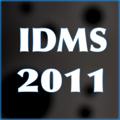Speaker
Pat Scott
(McGill University)
Description
Events like inflation and phase transitions in the Early Universe could have introduced large density perturbations on very small scales. Such power at large wave-numbers is not constrained by standard probes of the primordial power spectrum like the CMB; existing limits come only from primordial black holes (PBHs). Any additional probe of such small scales would be exceptionally useful in discriminating between e.g. different inflationary models. Moderate-amplitude perturbations can collapse shortly after equality to form ultracompact minihalos (UCMHs) of dark matter, in far greater abundances than PBHs. If dark matter self-annihilates, UCMHs become very promising targets for indirect detection. I will describe the fluxes one might expect from such objects, prospects for observing them with Fermi and Cherenkov telescopes, and demonstrate what limits their non-observation by Fermi places upon the primordial power spectrum.
Author
Pat Scott
(McGill University)
Co-authors
Torsten Bringmann
(Hamburg University)
Yashar Akrami
(Oskar Klein Centre, Stockholm University)

